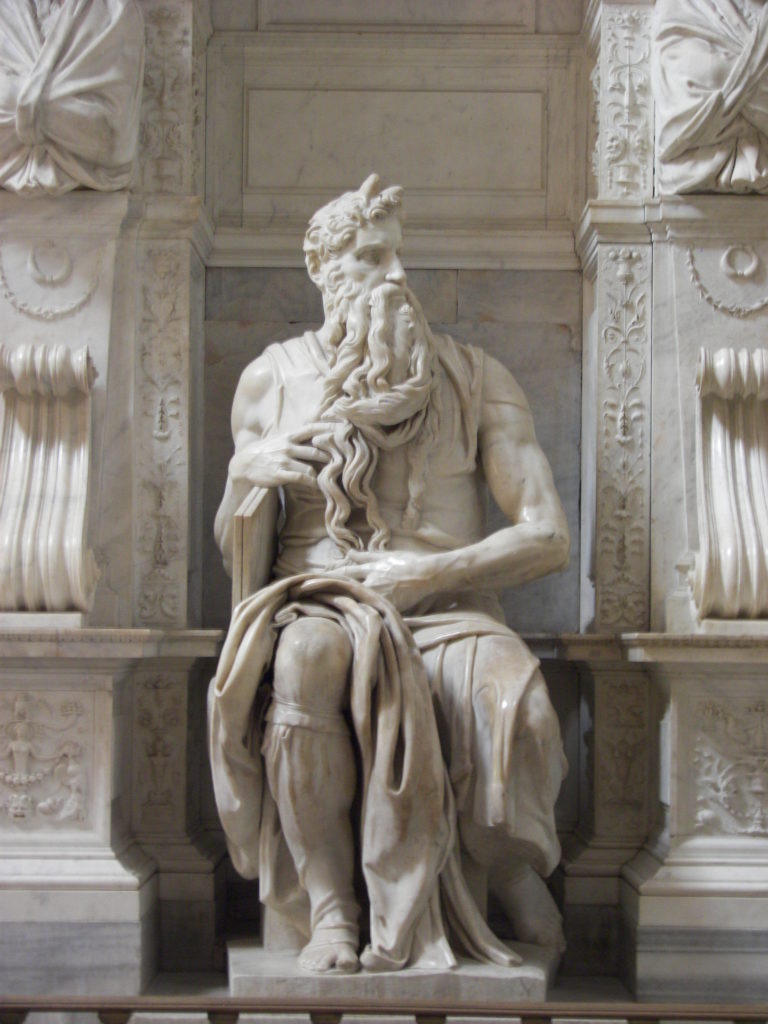[Greek] ὑπερβάλλω (hyperballō), [Latin] supere, [Latin] excellens, [Latin] eminens, [Latin] supereminens: to become an hyperbole, to surpass, to be far more, to “throw beyond”, to be much greater, to go beyond, to exceed; 2Cor.3:10, 2Cor.9:14, Eph.1:19, Eph.2:7, Eph.3:19

Michelangelo’s Moses at San Pietro Vincoli in Rome (1513-1515)
Background information:
Greek Hellenism: This term, used quite extensively in various contexts, means to go beyond, to surpass, and to excel. The Greek verb ballo means to throw. Isocrates’ To Demonicus 1.28 states “But for your life in general, cherish your possessions not in excess, but in moderation.” Homer’s Illiad 23.843 states “Great Telamonium hurled the mass from his strong hand, and sent it past the marks of all.” Demostenes’ Against Aristocrates 23.122 states “But we should, I think, carry both our friendship and our hatred only so far as to not to exceed the due measure.” Euripides’ Alceste 1077 states “Do not then be excessive in grief but bear your sorrow moderately.” Plato’s Laws 12.945c states “It is by no means easy to find an officer of officers, who surpasses them in excellence, but still one must try to find some examiners of a divine quality.”
Old Testament: This term has the basic sense of going beyond. Fear of the Lord surpasses all else. Its possessor is beyond compare (Sir.25:11). He flattered him with such an air of authority that he secured the high priesthood himself, outbidding Jason (2Macc.4:24). The craze for Hellenism and foreign customs reached such a pitch (2Macc.4:13). Enough has been said about the sacrificial meals and the excessive cruelties (2Macc.7:42). Both friends and bodyguards, seeing the severe punishment that had overtaken him, quickly dragged him out, panic-stricken in their exceedingly great fear (3Macc.2:23).
New Testament: This term, occurring in Paul’s letters, refers to (God) Jesus’ surpassing qualities and the new covenant’s glory. Ephesians makes reference to the saving event in Christ. Such examples include Jesus’ surpassing power, Jesus’ immeasurable graces, Jesus’ surpassing love, and God’s surpassing grace. Paul contrasts the relative glory of the two covenants. Paul speaks to the greater glory of the New Covenant (ministry of righteousness) as compared to the Old Covenant (ministry of death). Paul asserts that Christians have a glory that far surpasses that which Moses had received. Paul makes reference to Moses’ face being radiant upon coming down from Mount Sinai (Exo.34:2-30).
Scripture:
“That in the ages to come He might show the immeasurable riches of His grace in His kindness to us in Jesus Christ.” Eph.2:7
Jesus show His abundance in grace
“Indeed, what was endowed with glory has come to have no glory in this respect because of the glory that surpasses it.” 2Cor.3:10
The New Testament’s glory surpasses the Old Testament’s glory. Only the New Testament can be glorious.
Why does Michelangelo’s statue of Moses have horns? The Hebrew verb karan means to make radiant. As Moses came down from Mount Sinai, his skin (face) had become radiant when he spoke to the Lord. Interestingly, the related Hebrew noun keren means horn or projection. When applied to God, keren means ray of light. This ray of light would have started from a fixed point (from the sun) moving downward (and outward) like a ▲. This triangular figure not surprisingly also takes the shape of a horn. In medieval Christian Europe, this scripture passage would have been translated as “Moses horned with radiance”. Therefore, Michelangelo placed these unusual horns on Moses.
Conclusion:
Hyperbole, super, supercede, excellent, eminent
Regarding the Greco-Roman era, I was not surprised that this term would be used in many situations and contexts. I found an interesting statement about not cherishing possessions in excess. That’s quite a wise psychological and philosophical statement even in the secular world! I had provided just a few examples. Some of the more nuanced examples include outbidding someone, prevailing over someone, passing a day without fighting, and a kettle boiling over.
It makes sense that this term would highlight Jesus’ surpassing gifts and graces for the encouragement of Paul’s followers. It is interesting that Paul makes a clear distinction between the Old Covenant and the New Covenant. The New Testament is superior. Paul also make references to the glory that Moses had received.
It is interesting to note that the Hebrew term is linked with radiance and with a horn. Therefore, it is plausible that being radiant is like being “horned” with radiance. I suppose it would make sense that Michelangelo would place these unusual horns on the statue of Moses.
A hyperbole is something exaggerated (thrown beyond). And that is not an exaggeration!

Do you mind if I quote a couple of your posts as long as I provide credit and sources back to your blog? My blog is in the exact same area of interest as yours and my visitors would certainly benefit from some of the information you provide here. Please let me know if this okay with you. Thanks a lot!
Hi Kent,
That’s fine with me.